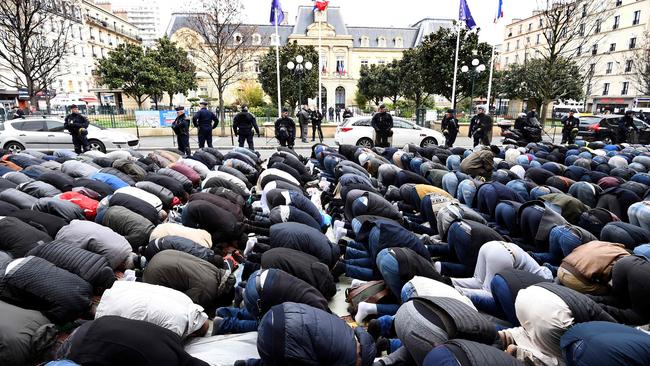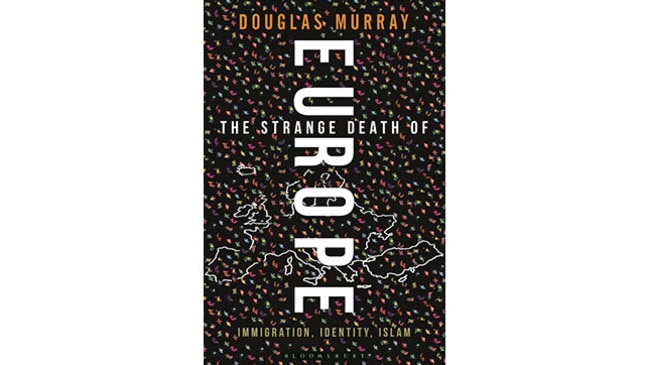Europe: immigration, identity, Islam: Douglas Murray warns of dangers
Douglas Murray warns of the danger he believes Islam poses to the future of Europe and the West.

Douglas Murray was born in London in July 1979, putting him midpoint between Ayatollah Ruhollah Khomeini’s January flight from Paris to Tehran to lead the Shia Muslim revolution, and the Soviet invasion of Afghanistan in December, which triggered a global Sunni Muslim jihadist reaction.
On September 22, 1979, Khomeini made a speech to university students in Tehran, declaring that “those intellectuals who say that the clergy should leave politics and go back to the mosque speak on behalf of Satan”. Alas, the clergy in question have not left politics.
During Murray’s childhood, Khomeini established a theocratic state in Iran. Just after he reached adulthood, the Sunni jihad movement declared war on the US. Just after he turned 22, the hijacked planes crashed into the World Trade Centre and the Pentagon, and the US retaliated by invading Afghanistan to hunt down al-Qa’ida’s leadership.
Throughout Murray’s life, jihadist terrorism has grown worse and worse, while Muslim immigration to and activism within Europe have increased relentlessly.
In short, this journalist, author and political commentator has lived all his life against a background of Muslim insurgency and terrorism, as well as massive and now all-but-unrestricted Muslim immigration into Europe.

The Strange Death of Europe is about the danger he believes this poses to the future of Europe. It is intended as a clarion call to Western societies but above all Western European societies. The opening sentence reads: “Europe is committing suicide.” That is an extraordinary claim. Extraordinary claims require extraordinary evidence. He provides what may be described as such evidence. This makes his book important, indeed compelling reading.
He declares that “by the end of the lifespans of most people currently alive, Europe will not be Europe and the peoples of Europe will have lost the only place we had to call home”.
If you find this claim shocking or wildly implausible, you should read this book and absorb the full weight of Murray’s argument. For, though you may jump to the conclusion that he is being a bit hysterical, he is a highly educated and deeply humane individual and the case he makes is troubling, just because it is not hysterical. He is gay and committed to Western freedoms. What he fears is the rising of reactionary and homophobic Islam in the West.
He argues in some of most thoughtful and interesting chapters — Prophets without honour, The tyranny of guilt, Tiredness, and The feeling that the story has run out — that Europe has lost its moorings and is a ship in serious danger of capsizing. He thinks nihilism has eviscerated Europe, so that it no longer believes in itself and has lost the instincts needed even for cultural survival. Whatever your point of entry to this debate — even if you are a Muslim — these chapters make thought-provoking reading and are highly recommended.
Nihilism is not a concept common to human cultures. It is chiefly associated with the self-critique of Western culture since the late 19th century and especially with the writings of Friedrich Nietzsche, who wrote in the winter of 1887: “What I write is the history of the next two centuries. I describe what is coming, what can no longer come differently: the advent of nihilism. This history can be related even now; for necessity itself is at work here. This future speaks even now in a hundred signs …”
Murray believes he is seeing those signs all around him and they alarm him deeply.
His evidence for this is richly varied. Some of it comes in direct quotes from prominent political and intellectual figures who have openly declared Europe does not have a culture worth defending and that Islam has much to offer the West. He sees this as a deeply confused and culturally suicidal attitude, and is pessimistic because he is largely persuaded that this attitude is now too deeply entrenched to be changed, short of a cultural and geopolitical upheaval.
Murray dismisses scornfully the retort that such attitudes as his are merely irrational or racist Islamophobia. He marshals a wide array of evidence about immigration, multiculturalism, crime, public opinion polls, terrorism and craven political correctness that is documented closely and presented calmly.
The net effect, on a close reading, is deeply disconcerting, not because Murray seems unhinged but because Europe itself does — or at least far too many of its political and opinion leaders.
Against that background, he reflects on the angry last writings of the great Italian journalist Oriana Fallaci, denouncing what she saw as the betrayal of the West and the capitulation of its leaders to Iranian and Sunni jihadist intimidation. In The Rage and the Pride (2002), written as a furious response to the 9/11 assault on New York (where she lived), Fallaci excoriated those who were refusing to defy Islamic totalitarianism, Shia and Sunni alike. Murray comments that her language was at times excessive, but her fury warranted.
Elsewhere, he draws attention to two French novels, written 42 years apart, that prophesise a strange capitulation by France to Islam. The first, in 1973, was Jean Raspail’s The Camp of the Saints. The second, in 2015, was Michel Houellebecq’s Submission.
Raspail eerily foresaw a tidal wave of Muslim immigrants coming to France and the country unable or unwilling to turn them away.
Houellebecq, notoriously, writes of Muslim political figures taking over France in 2020, equally without resistance, and the novel’s key character — the decadent scion of a culture at its fag end — converting to Islam for the sake of money, polygamy and a teaching job.
His discussion of the two novels is illuminating. If you have read Houellebecq’s Submission and found yourself queerly drawn to its demoralised sense of European capitulation and emptiness, Murray’s book is for you. It offers empirical evidence in place of novelistic imagination and serious thinking in place of disconcerting and provocative fantasy. The beauty of the book is that it constitutes a systematic and morally coherent argument.
One may freely challenge the argument, but this is at the very least a presentation of it with which as many of us as possible must engage.
Murray travelled widely and collected a great deal of data for his book. He visited the European frontiers where the immigrants have been pouring in. He interviewed people across the spectrum from genuine refugees to political figures. He has put the problem in historical, continental, political and cultural context. He is literate, dignified and highly articulate.
Reading his book, I found myself thinking uncomfortably of the Gothic and other Germanic migrations into the Roman Empire from the 3rd century to the 5th; and the Arab migrations of the 7th and 8th centuries that swamped the southern and eastern littorals of the Roman world and overran the Persian and Turkish worlds. Murray clearly sees these historical antecedents and their implications as relevant points of reference. It is not clear that he is in error. It would be reassuring, however, if a serious and temperate debate was to be prompted by his book and policies put in place to prevent what he fears from coming about.
Paul Monk’s books include The West in a Nutshell: Foundations, Fragilities, Futures.
The Strange Death of Europe: Immigration, Identity, Islam
By Douglas Murray
Bloomsbury, 352pp, $34.99




To join the conversation, please log in. Don't have an account? Register
Join the conversation, you are commenting as Logout